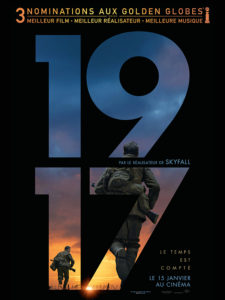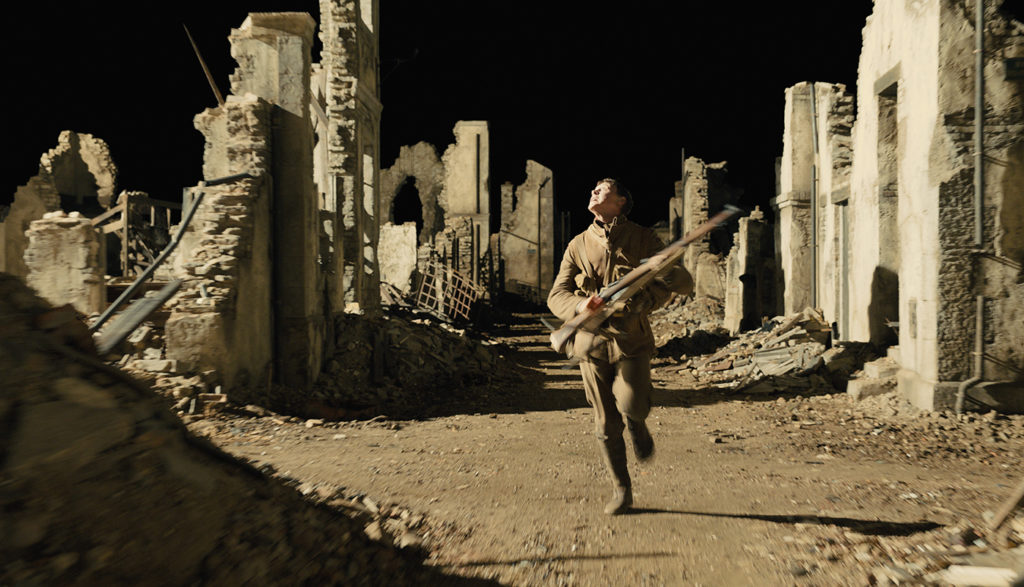
On 2nd February 2020, 1917 won a raft of Bafta awards. Fittingly. Because with its British nationalism, its go-it-alone message, it is the ideal film to usher in the post-Brexit era.
Although called 1917, Mendes’ film could have been called anything, or set anywhere: it could have been a western, a film about aliens, and in fact the devastated cratered warscapes have something of an extraterrestrial feel. Not much happens. Two British lance corporals get sent with orders to the Second Batallion of the Devonshire Regiment to call off a planned attack: if the attack is not called off, the batallion risks being decimated. One of the men, Blake, has a strong motive to take on this mission impossible because his brother serves in the threatened batallion. But before he can pass on the message, he is killed by a dastardly German pilot who thanks him for rescuing him from a burning plane (at great personal risk) by stabbing him in the stomach.
The Germans don’t come off well in 1917. They are portrayed as either dastardly, drunk, or underhand, and as terribly bad shots. Their trenches have larger rats than British trenches. We are also informed that they have been killing all the French cows to prevent them providing a source of milk or food for the enemy. For some rea- son, they overlook one cow, which, by an act of magic, has managed to milk itself (certainly there is no sign of a farmer) and even direct its milk into a bucket. The surviving lance corporal, Schofield, fills his flask with this milk, which comes in very handy when he meets a French girl with a baby. The French girl is not the baby’s mother, and doesn’t know who the mother is, or the baby’s name. A new French-Brit- ish family, succoured by Schofield, is briefly hinted at in the midst of this war-torn anonymity. Otherwise the French are conspicuous in this film through their absence.

After an extended WW1 version of a wolf run which includes jumping into raging torrents, being swept over a waterfall and dodging countless bullets, Schofield reaches the regiment. He is too late to stop the first wave of men charging towards the enemy, but he does prevent subsequent attacks. Rather unkindly, he is told to fuck off by the commanding officer. In this film, it is the solid working class that leads the way, not the officer “donkeys”.
The storyline lacks logic. Because the Germans had cut telephone lines, it was not possible to ring up the threatened regiment. But where had the regiment which sent out the two runners got the aerial photographs from, and would not some kind of contact existed between the reconnaissance and the Devonshires? Couldn’t one of those planes that were buzzing around have dropped a message? What was another British régiment doing wandering around in what most people still thought was German-held territory? How was it that Schofield managed to reach the regiment, in the end, without a compass? Certainly mother nature helped, sweeping him downstream to a group of singing Brits from exactly the regiment he wanted to contact. There are a few token appearances by a Sikh and two black soldiers. Just as German postwar films had problems including more than one Jew (Heaven forbid the audience might think more than one was persecuted), so this film cannot dare to include more than the odd non-white (Heaven forbid the audience might think it wasn’t 99.9% whites who won us the war).
The film has atmosphere, for sure. The mise en scene echoes German, British and French drawings, paintings and photographs of the battlefields. The cinematography has rightly been widely praised.
But in the end, 1917 reproduces and recycles the worn cliche of plucky British individuals defying the odds, borrowing from the aesthetics of video games as it does so. The fact that it is now the working class soldier who is the hero rather than an officer changes nothing about that. Like Saving Private Ryan, which also focused on rescue, it creates an illusion that saving lives matters in war. What matters is their senseless destruction. ❚
——
Sam Mendes, 1917, 2019, Neal Street Productions, 1h59.
